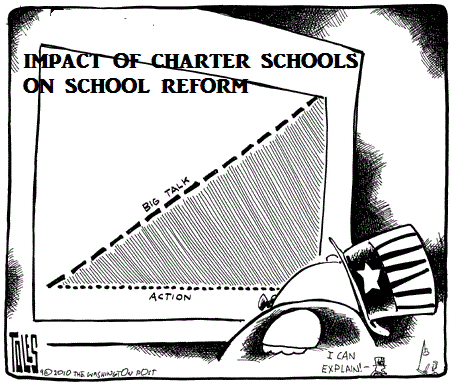The following practitioner articles explain neoliberalism (an ideology behind corporate education reform), and examine a huge component of the neoliberal agenda, charter schools. A synthesis of the two articles is provided below.
Horton, P. (2014). Paul Horton: Will the Market Destroy Public Education? Retrieved from Education Week website: http://blogs.edweek.org/teachers/living-in-dialogue/2014/07/paul_horton_will_the_market_de.html?qs=corporate+reform42
Karp, S. (2013). Charter Schools and the Future of Public Education. Rethinking Schools, 28(1).43
 14
14
Horton explains that current education reform is based on neoliberalism, the idea of a free market with limited government intervention, regulated by competition and self-interested consumers.42 Wall Street investors largely purchase and even sell stock that encourage the formation of education markets, and wealthy tech entrepreneurs also support these right-wing ideologies that enable them to preserve their wealth.42 Together, investors and tech entrepreneurs “push neoliberal attacks on public education by pushing an agenda that supports charter schools, computer driven learning, and assessment schemes that are designed [to] measure [the] success of students and teachers in ‘real time.’”42
Horton and Karp both oppose this neoliberal agenda, and Karp focuses specifically on the neoliberal agenda of charter schools and its negative consequences. Karp explains that charter schools typically use public funds but are managed privately, in order to allow for innovation and alternative approaches to learning.43 But an updated national study by CREDO (Center for Research on Education Outcomes) in 2013 showed that as a collective, the difference between the academic test performance of charter schools and traditional public schools is insignificant.43
 30
30
In fact, the charters that do experience greater success in terms of test scores have very different student demographics in comparison to traditional public schools. As such, their success can be attributed to the fact that they educate “fewer special-needs children, fewer English language learners, and fewer children from the poorest families.”43 Charters frequently use tests or a lottery system for admission, and this selective process often excludes low-income students.42 Charter schools thus contribute to the resegregation of schools, with traditional public schools receiving students with greater needs. Moreover, when students choose to attend charter schools, the public education fund per student follows the student to the charter school, draining resources from traditional public schools that are often underfunded.43
Charter schools negatively affect traditional, district schools, but they create other problems as well. The creation of charter schools undermines the teaching profession, as charters often hire nonunion teachers at a reduced salary.42 Non-unionized teachers are disadvantaged, as they are without job protections and can easily be fired. 42 Furthermore, charters are not held to the same accountability and transparency as traditional public schools, and thus encounter “serious problems of mismanagement, corruption, and profiteering.”43 While public schools encounter problems as well, they are more accountable for them.
In short, corporate education reform can be seen as an attack on the very DNA of the United States. Horton relates that corporate reform goes against founding father Thomas Jefferson’s intent for public schools to “create leaders to serve the commonwealth,”42 as the charters themselves fail to serve the commonwealth due to their selectivity. The formation of charter schools also contradicts the Civil Rights Movement that fought for integrated schools and equal funding, as charter schools foster resegregation and contribute to funding shortages in public schools.42 Corporations and wealthy individuals, who grant financial support for privatization, direct a misguided education reform movement that goes against the public good. In corporate reform, and the charter movement in particular, parents are perceived as customers without an active role in school governance and child advocacy.43 But in reality, Karp argues that parents should be the “owner-managers of a fundamental public institution in a democratic society.”43 Parents, rather than corporations, need to be at the center of education reform.
